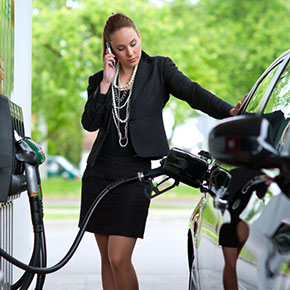 There's a popular quote that says "A lie will go round the world while truth is pulling its boots on." This is true when it comes to four popular car myths, rumours and urban legends.
There's a popular quote that says "A lie will go round the world while truth is pulling its boots on." This is true when it comes to four popular car myths, rumours and urban legends.
- Related Read: Twelve Common Myths About Car Insurance
Using Your Cell Phone While Pumping Gas Will Cause an Explosion
Image if you will: You're at the gas pump and in the thirty seconds that it takes for the tank to fill, you decide to tweet about your gas pumping experience. But then someone sees you with your cell phone out and they instantly duck for cover. The theory is that an electrical spark from your cell phone can cause a massive explosion if near a gas station.
According to the Federal Communications Commission, there is no evidence to suggest this story is true stating, "The wireless industry has done studies on the potential for wireless phones to create sparks that could possibly ignite flammable materials. The studies generally conclude that while it may be theoretically possible for a spark from a cell phone battery to ignite gas vapor under very precise conditions, there is no documented incident where the use of a wireless phone was found to cause a fire or explosion at a gas station."
That said, it is theoretically possible under very precise conditions that a cell phone could be the ignition source for gas fumes. Even though there has never been a documented case for it happening, why risk it?
Premium Gas Is Best For Your Car. The Premium Vs Regular Debate
Some people swear that putting premium gasoline in a non-premium car will make your car run better. Not so, according to Vancouver auto repair shop Tremblay Motors, "Most vehicles run just fine on regular-grade (87 octane) fuel. Using premium in these cars won't hurt, but it won't improve performance, either. A higher-octane number simply means that the fuel is less prone to pre-ignition problems, so it's often specified for hotter running, high-compression engines. So if your car is designed for 87-octane fuel, don't waste money on premium."
- Related Read: Gas Prices Driving You To Walk? Fuel Savings Tips
How Often Should You Change Your Oil? Do You Really Need To Change Your Car's Oil Every 5000 Kilometres?
It turns out, people are changing their car's oil far too frequently because nowadays, most new cars can go far longer between oil changes. So how frequently do you really need to change your car's oil? According to Petro-Canada's PumpTalk, "With so many advancements in automotive technology and engine oil, many auto manufacturers now recommend oil changes anywhere from 6,000 km to 25,000 km, or at 3 - 6 month intervals, depending on your driving style."
If you're not certain about your car's needs, check your car's user manual or ask your dealership for all you need to know.
Red Cars Cost More To Insure
A lot of drivers believe that car colour matters when determining your car insurance rate. It does not. It doesn't matter if your car is a blue, red, green, silver, white, or black, your insurance rate for that make and model of car will be the same.
Don't believe car colour doesn't matter? Compare car insurance quotes today and not only will we shop the market for you (no one else covers as much of the market as Kanetix.ca), but you'll see that in order to get accurate rates you are not once asked about the colour of your car.




